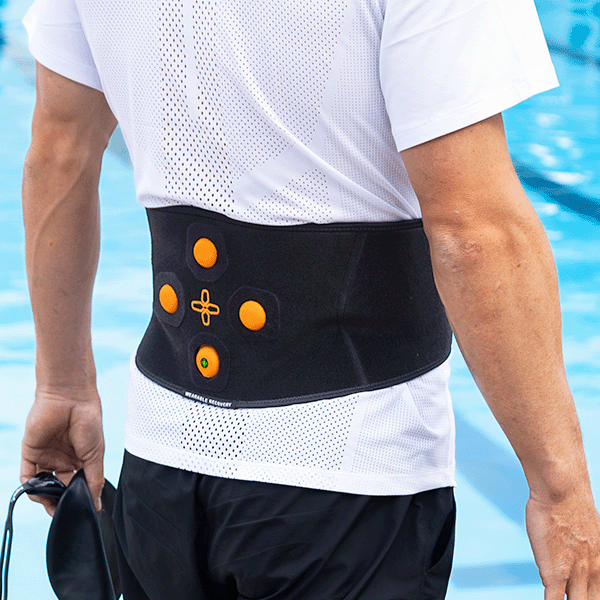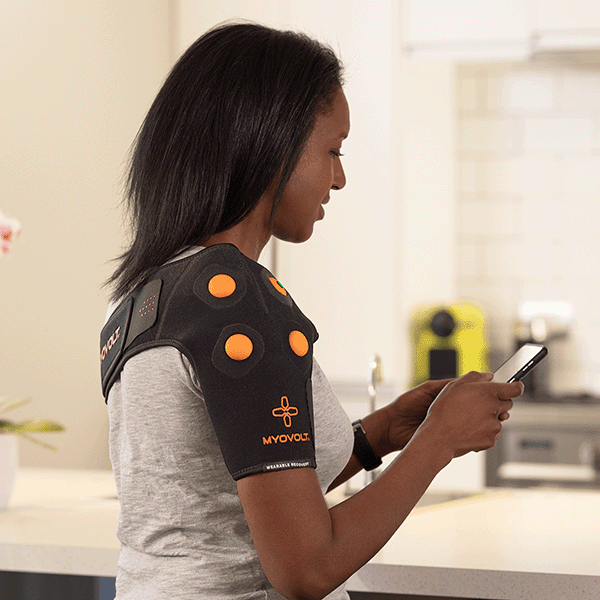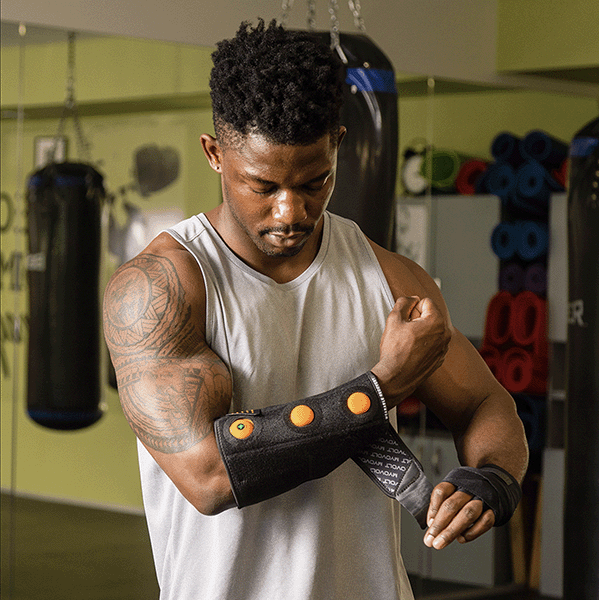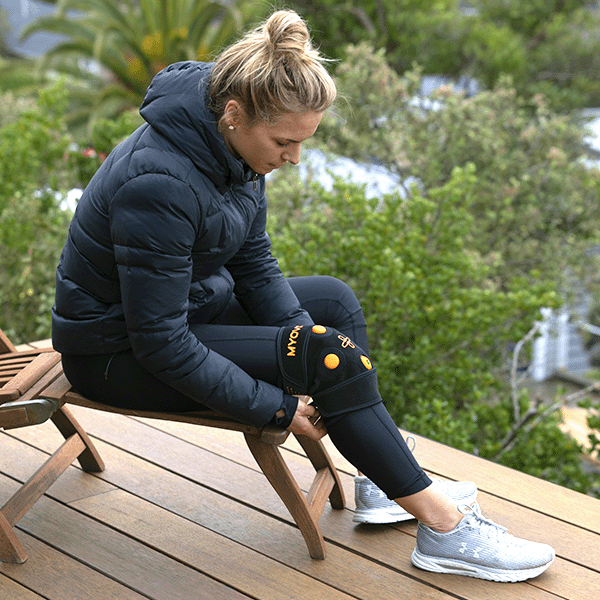Pushing my body to the limit.
Dr Hannah Wells
Pro Ironman, Triathlete & Marathon Runner
Dr Hannah Wells - off-road Xterra triathlete, Pro Ironman triathlete, Marathon runner and Myovolt user.
Since turning professional in 2019, Hannah Wells has taken the world of by storm. She has ten IRONMAN 70.3 and long course triathlon wins to her name, as well as a stunning win in the 2019 ASB Auckland marathon.
In March 2021 she won her first full distance Ironman at Taupo, NZ and then in September took 2nd place in the Ironman 70.3 on the Sunshine Coast, Australia. Now she's hard-out training in the US ahead of her first international full Ironman event in Florida on November 6th, followed by Clash Daytona on 5th December.
2021 has certainly been a busy year for Hannah, but we managed to grab some time with her to find out more about her love of endurance sport.
“I want to see how far I can go if I put all my energy and effort into being the best I can be.”
Q & A
Q. Hannah, how are you feeling going into your first full distance international Ironman in Florida this month?
A. I am feeling very excited and also a little nervous. There is a whole field of athletes I have never raced before, and a much larger field than what I have raced in so this is a big opportunity for me to learn and see how I stack up currently against an international field. I am feeling fit and ready to race so it will be fun to get out there and give it everything I have.
Q. Have you had to prepare differently for this US competition compared to races back home in NZ?
A. I have prepared slightly differently to my first full distance event in Taupo earlier this year. Before coming to the US in October, I was training in Noosa, Australia for around four months which has helped me to acclimatize for the conditions here in Florida. Because this race could be quite warm I have incorporated some training in the heat in the last few weeks, choosing the warmest parts of the day to train, particularly on the run. Other than that this build up has been about trying to build on my previous Ironman prep, which I have managed to do and I am training better than ever.
Q. Its been a significant journey for you to get to this point in your career as a professional athlete, what was your sporting background growing up? How did this contribute to you taking up triathlon?
A. "I played a lot of sport growing up. Weirdly though, no swimming, biking or running (specifically). I was more of a team sports person through high school and University, playing for both the Massey Uni A netball and volleyball team. It was late in 2012 when I stumbled across
the local triathlon club at the pool, I was there trying to keep fit while nursing a foot injury from netball. I joined in on the clubs swim squad session (badly) and from there fell in love with the challenge of the sport and never looked back."
Q. What was it about endurance sports that led you into a full-time commitment?
A. "What lured me into going full time was wanting to see how far I
could go if I put all my energy and effort into being the best I can be in endurance sport. I love just training, and racing is the icing on the cake,
so to be able to do this as my job is a dream come true."
Q. Out of the three sports in triathlon, which one is the most challenging for you and which one do you enjoy the most?
A. "I love them all and at same time I find all three very challenging.
I go through phases of finding each of the three more difficult than
the others, depending on what my training focus has been. Although
if I had to pick I would probably say that I still find swimming the most challenging, since I didn’t swim when I was younger. Running is
probably my favourite over biking, but only just."
Q. What does a typical day of training look like to you, say if you were in the middle of race prep?
A. "It could be anywhere between 2 to 6 hours of training. But a pretty typical day may look something like a 4 to 5 km swim (1.5 hours), a 1.5
to 3 hour bike ride with a 30 to 60 minute run off the bike."
Q. With international and local competitions being cancelled over the last couple of years due to COVID, what’s motivated you to keep training and pushing your performance?
A. "I love to train anyway, so the motivation to keep training isn’t too hard. What I am finding harder is planning my training, dealing with the disappointments of race cancellations and keeping focus on the big picture. Plans are forever changing with race cancellations and unknowns, so it is making it pretty hard to put together a well periodised plan."
Q. What’s your typical recovery regime after training? Is it the same for each sport or does it differ depending on what you are working on?
A. "Recovery is just as important as training. Every week, every day, I’m looking to set new training goals, find new ways to build strength and speed, and better ways to recover.
In between sessions or after sessions I firstly prep some good recovery food (like a smoothie) and then I spend a bit of time off my feet, resting
on the couch using my Myovolt on any particularly tight areas. I also meditate and try to do a bit of stretching and mobility most days."
Pushing my body to the limit.
Dr Hannah Wells, Pro Ironman & Triathlete
Dr Hannah Wells - off-road Xterra triathlete, Pro Ironman triathlete, marathon runner and Myovolt ambassador.
Since turning professional in 2019 Hannah Wells has taken the world of triathlon by storm. She has ten IRONMAN 70.3 and long course triathlon wins to her name, as well as a stunning win in the 2019 ASB Auckland marathon.
In March 2021 she won her first full distance Ironman at Taupo, NZ and then in September took 2nd place in the Ironman 70.3 on the Sunshine Coast, Australia.
Now she's hard-out training in the US ahead of her first international full Ironman event in Florida on November 6th, followed by Clash Daytona on 5th December.
2021 has certainly been a busy year for Hannah but we managed to grab some time with her recently to find out more about her love of endurance sport.
“I want to see how far I can go if I put all my energy and effort into being the best I can be.”
Q & A
Q. Hannah, how are you feeling going into your first full distance international Ironman in Florida this month?
A. I am feeling very excited and also a little nervous. There is a whole field of athletes I have never raced before, and a much larger field than what I have raced in so this is a big opportunity for me to learn and see how I stack up currently against an international field. I am feeling fit and ready to race so it will be fun to get out there and give it everything I have.
Q. Have you had to prepare differently for this US competition compared to races back home in NZ?
A. I have prepared slightly differently to my first full distance event in Taupo earlier this year. Before coming to the US in October, I was training in Noosa, Australia for around four months which has helped me to acclimatize for the conditions here in Florida. Because this race could be quite warm I have incorporated some training in the heat in the last few weeks, choosing the warmest parts of the day to train, particularly on the run. Other than that this build up has been about trying to build on my previous Ironman prep, which I have managed to do and I am training better than ever.
Q. Its been a significant journey for you to get to this point in your career as a professional athlete, what was your sporting background growing up? How did this contribute to you taking up triathlon?
A. "I played a lot of sport growing up. Weirdly though, no swimming, biking or running (specifically). I was more of a team sports person through high school and University, playing for both the Massey Uni A netball and volleyball team. It was late in 2012 when I stumbled across the local triathlon club at the pool, I was there trying to keep fit while nursing a foot injury from netball. I joined in on the clubs swim squad session (badly) and from there fell in love with the challenge of the sport and never looked back."
Q. What was it about endurance sports that led you into a full-time commitment?
A. "What lured me into going full time was wanting to see how far I could go if I put all my energy and effort into being the best I can be in endurance sport. I love just training, and racing is the icing on the cake, so to be able to do this as my job is a dream come true."
Q. Out of the three sports in triathlon, which one is the most challenging for you and which one do you enjoy the most?
A. "I love them all and at same time I find all three very challenging. I go through phases of finding each of the three more difficult than the others, depending on what my training focus has been. Although if I had to pick I would probably say that I still find swimming the most challenging, since I didn’t swim when I was younger. Running is probably my favourite over biking, but only just."
Q. What does a typical day of training look like to you, say if you were in the middle of race prep?
A. "It could be anywhere between 2 to 6 hours of training. But a pretty typical day may look something like a 4 to 5 km swim (1.5 hours), a 1.5 to 3 hour bike ride with a 30 to 60 minute run off the bike."
Q. With international and local competitions being cancelled over the last couple of years due to COVID, what’s motivating you to keep training and pushing your performance?
A. "I love to train anyway, so the motivation to keep training isn’t too hard. What I am finding harder is planning my training, dealing with the disappointments of race cancellations and keeping focus on the big picture. Plans are forever changing with race cancellations and unknowns, so it is making it pretty hard to put together a well periodised plan."
Q. What’s your typical recovery regime after training? Is it the same for each sport or does it differ depending on what you have been working on?
A. "Recovery is just as important as training. Every week, every day, I’m looking to set new training goals, find new ways to build strength and speed, and better ways to recover.
In between sessions or after sessions I firstly prep some good recovery food (like a smoothie) and then I spend a bit of time off my feet, resting on the couch using my Myovolt on any particularly tight areas. I also meditate and try to do a bit of stretching and mobility most days."
“Myovolt is great because not only can I use it while resting on the couch, but I can also leave it on while doing other things.”
“Myovolt is great because not only can I use it while resting on the couch, but I can also leave it on while on the move.”
Q. How much time during a typical training day do you dedicate to
just recovery?
A. "At least an hour per day. But with Myovolt I am able to extend that a bit longer since I can put it on while also doing other things. It’s become an important part of my daily routine. I’ve found myself using it multiple times a day."
Q. How does Myovolt fit into or complement the other parts of your recovery schedule?
A. "Myovolt is great because not only can I use it while resting on the couch, but I can also leave it on while doing other things such as chores, answering emails, or while in the car on my way to the next session."
Q. Alongside your athletic accomplishments, you also have a PhD in biotech engineering. Is the science behind the tools and techniques
you use within your training important to you?
A. "One thing I love about Myovolt is how the technology has been validated through clinical research. There’s a lot of evidence out there
that shows how and why it works."
Q. Have you been managing any injuries this year?
A. "I pulled a muscle in my lower back in early 2020 that prevented me from running for 6 weeks and had a big impact on my training, but
since then I've been managing things pretty well."
Q. When you return from the US, are there any endurance events
coming up in New Zealand in 2022 that you are thinking of attending?
A. "Yes, the Tauranga half marathon in January and then Challenge Wanaka in February, this is one of the world's toughest middle distance triathlon courses and the largest event in NZ. In March there's Ironman
NZ in Taupo too so its a pretty busy schedule in the early part of the year. Obviously these NZ races are still a bit up in the air due to the COVID situation but fingers crossed by January some races can go ahead"
Q. Do you have any advice for anyone out there to stay motivated during these challenging times?
A. "Move for enjoyment and health. There’s no need to be smashing exercise and training all the time, but now is probably a great time to make the most of just enjoying getting outside and exercising with no pressure to be at your fittest and fastest."
Thanks for taking the time to chat with us Hannah, the Myovolt team wish you all the best for your upcoming US events and look forward to seeing you racing again in NZ in 2022.
Q. How much time during a typical training day do you dedicate to recovery?
A. "At least an hour per day. But with Myovolt I am able to extend that a bit longer since I can put it on while also doing other things. It’s become an important part of my daily routine. I’ve found myself using it multiple times a day."
Q. How does Myovolt fit into or complement the other parts of your recovery schedule?
A. "Myovolt is great because not only can I use it while resting on the couch, but I can also leave it on while doing other things such as house chores, answering emails, or while in the car on my way to the next session."
Q. Alongside your athletic accomplishments, you also have a PhD in biotech engineering. Is the science behind the tools and techniques you use within your training important to you?
A. "One thing I love about Myovolt is how the technology has been validated through clinical research. There’s a lot of evidence out there that shows how and why it works."
Q. Have you been managing any injuries recently?
A. " I pulled a muscle in my lower back in early 2020 that prevented me from running for 6 weeks and had a big impact on my training, but since then I've been managing things pretty well."
Q. When you return from the US, are there any endurance events coming up in New Zealand in 2022 that you are thinking of attending?
A. "Yes, the Tauranga half marathon in January and then Challenge Wanaka in February, this is one of the world's toughest middle distance triathlon courses and the largest event in NZ. In March there's Ironman NZ in Taupo too so its a pretty busy schedule in the early part of the year. Obviously these NZ races are still a bit up in the air due to the COVID situation but fingers crossed by January some races can go ahead"
Q. Do you have any advice for anyone out there to stay motivated during these challenging times?
A. "Move for enjoyment and health. There’s no need to be smashing exercise and training all the time, but now is probably a great time to make the most of just enjoying getting outside and exercising with no pressure to be at your fittest and fastest."
Thanks for taking the time to chat with us Hannah, the Myovolt team wish you all the best for your upcoming US events and look forward to seeing you racing again in NZ in 2022.
Featured in this story
Great for recovering tired, overworked knees, quad, calf or hamstring muscles. The neoprene leg brace has an adjustable fit ...
Featured in story
Great for recovering tired, overworked knees, quad, calf or hamstring muscles. The neoprene leg brace has an adjustable fit ...



